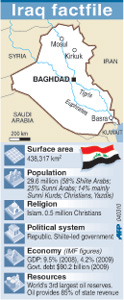BAGHDAD - Iraqis go to the polls on March 7 to elect a new Parliament for the second time under the country's permanent constitution of 2006. Many scholars believe that it is the second general election, not the first, which is the most important test of any new democracy. If so, these elections appear to foreshadow ominous times ahead.
The security situation in Iraq has deteriorated dramatically over the past six months. Though much of the violence in Iraq over the past six years has been random, aimed at soft targets such as markets and restaurants, its nature changed last summer.
On August 19, 2009, the sixth anniversary of the bombing that killed the United Nations representative in Baghdad, a series of spectacular attacks were carried out. These bombings, and others since, have targeted the Iraqi state and its infrastructure, including the ministries of finance and foreign affairs and municipal and judicial offices. Moreover, as United States troops have lowered their profile, daily violence of the more random variety has increased.
 |
Equally ominous, the banning of hundreds of candidates for alleged ties to the Baath Party signals a return to sectarian politics, which could reignite a sectarian civil war. The individuals banned include the current defense minister and several members of parliament. The message from Iran's allies in Iraq, who control the de-Baathification process, is clear. While some Shia who were prominent allies of the Baathist regime hold positions of great influence in the "new" Iraq, Sunnis will never know when they will be shut out of the process, especially if they become too powerful.
Some of Iraq's Sunni leaders might thus conclude that permanent armed opposition is their only viable strategy. True, they might not be able to topple the new regime, but they will be able to de-stabilize Iraq over the long term, in the hope of forcing a negotiated settlement of their grievances. The new Shia elites who control Iraq have emulated their allies in Iran, creating a system that effectively chooses which of their rivals may constitute a "legitimate" opposition and which may not participate in the political process.
The struggle of Iraq's Kurds should be instructive. As the Iraqi political scientist Ghassan Atiyyah, has noted, the Kurds, even without regional allies, have been able to de-stabilize Iraq for 80 years. How much more will the Sunnis be able to de-stabilize the country, he asked, enjoying as they do the support of most of the regional powers, including Saudi Arabia, Syria, and potentially Turkey?
Politics aside, the long-term damage to Iraq's legal institutions caused by these maneuverings should not be underestimated. After the de-Baathification order was issued (by a commission that does not actually have any sitting members) a panel of the Iraqi Court of Appeal essentially invalidated it. The prime minister then met with Iraq's chief justice, following which the court's decision was reversed.
There will be several ways to gauge the election's relative success. The first of these will be the length of time that it takes the victors to form a new government. If, as occurred after the last elections, months go by without the formation of a government, this will be confirmation that Iraq's political elites will continue to subordinate the desperate needs of the country - for security, electricity, water, and basic services - to their political futures as they haggle over positions. Whether competent technocrats, or as has happened in the past, party hacks are appointed to the ministries will be a telling sign.
Another sign will be the extent to which the newly elected leadership, which is likely to be largely the same as the current leadership, reaches out to real Sunni leaders. Doing so might well mean a retreat from the pre-election banning of candidates, and would demonstrate a maturity among the Shia political elites that they have not yet shown.
Finally, the reaction of the election's losers will be the key. That includes not only those who have been banned from running for office, but others as well. For example, it is likely that the current prime minister will not be able to form a new government. Even the principal Kurdish parties are facing a challenge from an independent party, Goran, and are likely to incur some losses to it. If these losers engage in post-election jockeying to cheat opponents of their fair allotment of seats, that will tell much about the future.
Whether Iraq achieves stability or is once again ripped apart by sectarian violence now depends, as it always has, on the new political elites. If the past is an indication of their future performance, there is reason for deep concern.
Feisal Amin Rasoul al-Istrabadi, a visiting professor of law at the Maurer School of Law, Indiana University, served as Iraq's Deputy Permanent Representative to the United Nations from 2004-2007 and was principal drafter of its interim constitution of 2004.
Copyright: Project Syndicate, 2010. Exclusive to the Sunday Times |


